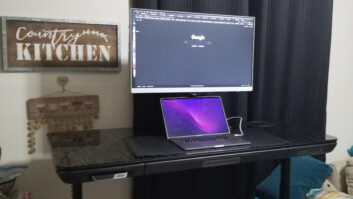Signaling a move toward lower price points in the handheld category, Dell made its official debut in the handheld market at Comdex with the lowest priced Pocket PC to date, at $199, while Hewlett-Packard unveiled a new low-priced iPAQ, at $299.
Shipping under the Axim brand name, Dell announced shipment of two Xscale-based PDAs, both with CompactFlash Type II and SD card expansion slots, and 3.5-inch transflective LCDs.
“When we looked at prices, especially for PocketPC, we saw that they were artificially high, said Steve Macon, Dell product marketing manager. “The top of the line iPAQ retails for $749 with integrated Bluetooth. You can get a Pentium 4 desktop for that. We saw a lot of opportunity with our business model — eliminating the traditional channel — in bringing a lot of value to the Pocket PC market and to really collapse pricing down to what’s been reserved for Palm devices.”
The new Dell Axim models offer QVGA screens with 65,000 colors and a resolution of 240 by 320 pixels. The step-up model runs at 400MHz with 64MB SDRAM and 48MB flash ROM, and the step-down model runs at 300MHz with 32MB each SDRAM and flash ROM. Suggested retail prices are $299 and $199, respectively.
Dell’s launch follows the announcement of a new reference platform for Pocket PCs from Microsoft and Samsung, which at least one analyst said, could result in lower PC prices. Alex Slawsby of International Data Corp., Framingham, Mass., said the new reference design could lower prices by $100 and “push PocketPC prices in the Palm band.”
Slawsby said, “I think Dell will have the biggest impact on its closest competition, which are the HPs of the world, and it will put pressure on Pocket PC vendors who have sold very expensive devices. It will be an interesting couple of months. It could mean price points will begin to change dramatically.”
HP introduced a new low-cost iPAQ h1910 Pocket PC at $299. Hailed as the thinnest and lightest Pocket PC, it features 64MB RAM, a 200MHz Intel XScale processor and SD expansion slot. It is joined by the industry’s first PDA with built-in WiFi and Bluetooth. Called the iPAQ H5450, it has integrated 802.11b and built-in biometrics security in the form of a thermal biometric fingerprint reader. Shipping is expected this month at $699.
Also at Comdex, watchmaker Fossil announced a licensing agreement with PalmSource to create the first Palm-based wristwatch. Fossil expects to sell in April or May 2003 a watch that is effectively a “Zire for the wrist,” according to Fossil technology VP Donald Brewer. called the WristPDA it will offer a 160 by 160 pixel screen with about a square inch of active pixel area. Users can input information using Graffiti handwriting recognition with a 10mm stylus that folds into the watchband. The WristPDA will use Palm 4.1 and offer 2MB of RAM. It comes with a PC synchronization cradle and it can accept third-party applications such as games, Docs To Go and Vindigo, Brewer said.
Fossil will offer the watch/PDA under the new name Abacus to consumer electronics and office and computer stores. It will be available in metal and plastic at $199 and lower.
Brewer compared the PDA wristwatch market to the fledgling handheld market before the emergence of Palm. “Wearable technology is similar to where handhelds were before the mid-90s. But I think we’ll really achieve the functionality that people want and we sit it on a very wearable watch design,” he said.
Sharp also announced a new Zaurus that adds more power and longer battery life. The new FL-5600 is a Linux-based Zaurus, which runs on a 400MHz XScale processor with 64MB flash ROM, and 32 MB SD RAM.
The new Zaurus has the same QVGA LCD as well as a QWERTY keyboard hidden behind a sliding cover. It is expected to ship in the first quarter of 2003 at a price to be announced.













